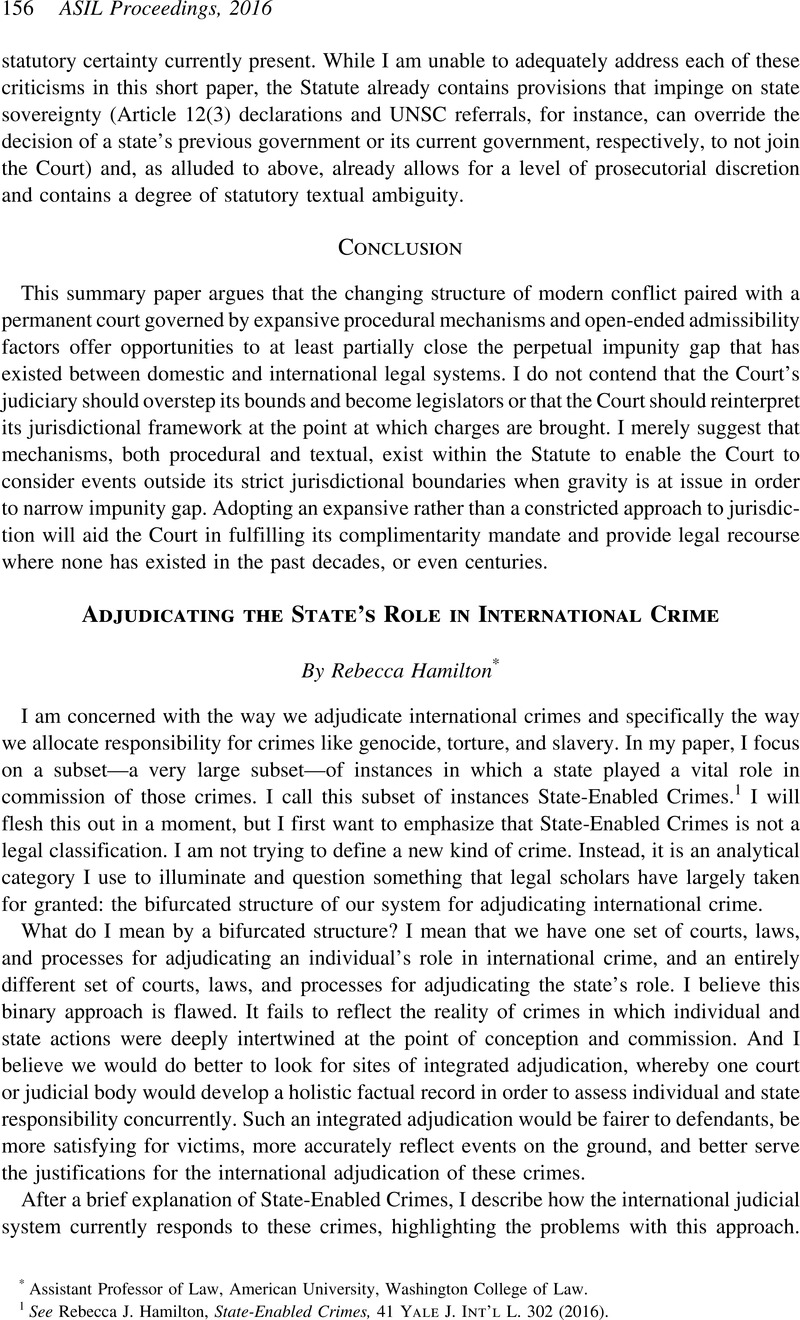No CrossRef data available.
Article contents
Adjudicating the State's Role in International Crime
Published online by Cambridge University Press: 18 May 2017
Abstract

- Type
- Conflict, Accountability, and Justice (New Voices)
- Information
- Copyright
- Copyright © American Society of International Law 2016
References
1 See Hamilton, Rebecca J., State-Enabled Crimes, 41 Yale J. Int'l L. 302 (2016)Google Scholar.
2 Comm'n for Int'l Justice and Accountability, Crimes Against Humanity Committed in Syrian Regime Detention Facilities (on file with author); Human Rights Watch, Torture Archipelago: Arbitrary Arrests, Torture, and Enforced Disappearances in Syria's Underground Prisons Since March 2011 (2012), at https://www.hrw.org/report/2012/07/03/torture-archipelago/arbitrary-arrests-torture-and-enforced-disappearances-syrias; Rep. of the Independent Int'l Comm. of Inquiry on the Syrian Arab Republic, U.N. Doc. A/HRC/S-17/2/Add.1, paras. 92–93 (Nov. 23, 2011).
3 See, e.g., Drumbl, Mark A., Collective Violence and Individual Punishment: The Criminality of Mass Atrocity, 99(2) Nw. U. L. Rev. 539 (2005)Google Scholar; Osiel, Mark, The Banality of Good: Aligning Incentives Against Mass Atrocity, Col. L. Rev. 1751 (2005)Google Scholar.
4 See e.g., Richard Goldstone & Rebecca Hamilton, Bosnia v. Serbia: Lessons from the Encounter of the International Court of Justice with the International Criminal Tribunal for the Former Yugoslavia, Leiden J. Int'l L. 95, 103 (2008).
5 To date, there has not only been uneven development in practice between the adjudication of individual criminal responsibility on the one hand and state responsibility on the other, but also an almost complete fracturing of the scholarly conversation. The one notable exception to this trend comes from a handful of Amsterdam-based scholars, led by André Nollkaemper, whose work appears in System Criminality in International Law (Andre´ Nollkaemper & Harmen van der Wilt eds., 2009).
6 See Prosecutor v. Dyilo, ICC-01/04-01/06-3129-AnxA, Order for Reparations, para. 156 (Mar. 3, 2015).)
7 Prosecutor v. Dyilo, ICC-01/04-01/06 AA2A3, Judgment on the Appeals Against the “Decision Establishing the Principles and Procedure to be Applied to Reparations” of 7 August 2012, with Amended Order for Reparations (Annex A) and Public Annexes 1 and 2, para. 65 (Mar. 3, 2015) (establishing “the balance of the probabilities” as the appropriate standard of proof for the reparations phase of ICC proceedings).
8 See supra note 3.
9 Mohamed, Saira, Reconciling Mass Atrocity and the Criminal Law, 124 Yale L.J. 1628, 1639 (2015)Google Scholar (introducing the term “deviance paradox”).
10 See, e.g., Drumbl, supra note 3.
11 See supra note 1 for a fuller discussion on the benefits of integrated adjudication to goals of prevention and reconciliation.
12 See generally James Crawford, The International Law Commission's Articles on State Responsibility: Introduction, Text and commentaries 1–60 (2002) (recounting the history of the discussion on state crime at the International Law Commission). See also Franck, Thomas M., Individual Criminal Liability and Collective Civil Responsibility: Do They Reinforce or Contradict One Another? 6 Wash. U. Global Stud. L. Rev. 567, 569–70 (2007)Google Scholar (emphasizing that “a finding of state responsibility is not tantamount to a determination of the people's collective guilt”).
13 See generally Rebecca Hamilton, Fighting for Darfur: Public Action and the Struggle to Stop Genocide (2011).




